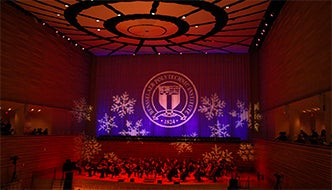
The Rensselaer Orchestra will perform under the direction of Nicholas DeMaison on Dec. 18.
Local residents are invited to join Rensselaer students, faculty, staff, and alumni and alumnae for the Institute’s annual holiday concert on Sunday, Dec. 18, in the Curtis R. Priem Experimental Media and Performing Arts Center (EMPAC) Concert Hall. The program begins at 3 p.m.
The Holiday Concert brings together a collection of music by composers searching for meaning while probing the existential depths.
“I think many people feel that 2016 has been an exceptionally challenging year, existentially speaking,” said Nicholas DeMaison, senior lecturer of music in the Department of the Arts. “As our capacities for communication continue to increase in speed and scope, we find ourselves more often in contact with and immediately touched by events that may at one time have been beyond our survey, or may have only reached us long after their occurrence.
“I hope this concert, at the end of the semester and end of the year, offers a chance to slow down, to escape the perpetual inundation of information, to be present with all of our uncertainties and our anxieties, as Ives, Shostakovich, and Tchaikovsky were as they wrote this music,” DeMaison said. “I hope that being present together for a few minutes, basking in the remarkable talents of our students, offers an opportunity for the mind and the heart to find solace and refreshment in a way they do not in our daily struggles.”
DeMaison is a composer and conductor who has led dozens of premieres of new operatic, instrumental, choral, and multimedia works, described as “consistently invigorating” (New York Times), “spine-tingling” (Feast of Music), and “enchanted” (Seen and Heard International).

The Rensselaer Orchestra is an ensemble of undergraduate and graduate students.
The Rensselaer Orchestra is an ensemble of undergraduate and graduate students. Established in 2013 by the Department of the Arts, the orchestra performs classics of the orchestral literature and regularly premieres new and experimental works. The group makes its performing home in EMPAC. The orchestra will perform Charles Ives’ “The Unanswered Question,” a programmatic work described by Ives as one of his “Two Contemplations” from 1908, exploring “the perennial question of existence.”
Following that piece, Mary Simoni, dean of the School of Humanities, Arts, and Social Sciences (HASS), along with two Rensselaer Orchestra members, will perform two movements of Shostakovich’s Piano Trio no. 2, in E minor, op. 67. The orchestra members are Russell Jones, a senior majoring in mechanical engineering and electrical engineering, and J.V. Parin, a junior majoring in computer and systems engineering. Composed during the war-ravaged summer of 1944, the trio performance selection shifts between moods of somberness, simple folkishness, urgency, satirical stridency, and at times anger, all in a search for musical redemption.
The program will finish with Tchaikovsky’s enormous Symphony no. 4, in F Minor, op. 36, which was written at a critical juncture during Tchaikovsky’s mid-30s. The composer described the opening theme of the symphony as a representation of fate, and the rest of the piece as a search for one’s place in its grand scheme.
“This year’s repertoire, brought to life through the musicianship of our students under the direction of Professor DeMaison, proclaims the noble resilience of the human spirit throughout time,” Simoni said. Members of the Rensselaer Orchestra will be joined onstage by members of the Grammy-winning Albany Symphony Orchestra.
The 90-minute concert is free and open to the public. The full program is as follows:
Ives: The Unanswered Question
Shostakovich: Piano Trio no. 2 in E minor, op. 67
Tchaikovsky: Symphony no. 4 in F minor, op. 36
Tickets are not required and seating will be on a first-come, first-served basis. Attendees are asked to register online.
When DeMaison was hired in 2013, he brought the Rensselaer Orchestra and the Concert Choir forward to be offered as classes, added in a Chamber Ensemble course that could accommodate various iterations of smaller groups, and began developing and conducting a concert series each semester.
“Having an orchestra and a choir and a chamber program that are functioning at a high level is really important for letting people know that we take all of this seriously,” said DeMaison.
The ensembles are only the beginning, however, of how Rensselaer students can participate in the creative and collaborative possibilities of music making. The learning experience of contributing one part to a musical whole is one of the cognitive benefits of playing music, particularly for students who will find themselves in what Simoni calls a “transdisciplinary” field such as biomedical engineering.


